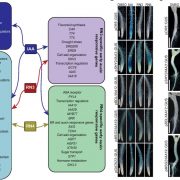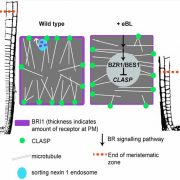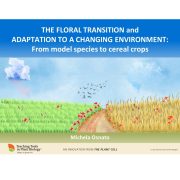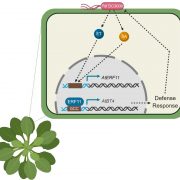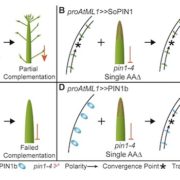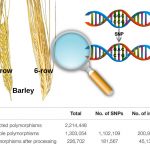Loss-of-function of a tomato receptor-like kinase impairs male fertility and induces parthenocarpic fruit set (Front Plant Sci)
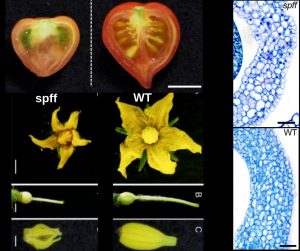 The flower-to-fruit transition (fruit set) and parthenocarpy, the pollination-independent development of seedless fruits, are controlled by complex hormone networks. Takei et al. identified a tomato gamma-ray induced mutant named small parthenocarpic fruit and flower (spff) with small fruits and flowers, male sterility, delayed flowering, and increased productivity (fruits per plant). Using genome-wide single nucleotide polymorphism arrays, mapping-by-sequencing and further validation by Knock-Down mutants using RNA interference (RNAi), the authors identified a monogenic recessive mutation in the Solyc04g077010 gene, which encodes a RLK protein (receptor-like kinase). The mutation associated is a 2bp deletion, which causes a frame-shift generating a truncated, loss-of-function RLK. Ovarian transcriptome analysis of spff lines revealed increased GA20ox1 levels, which is one of the key factors involved in gibberellin (GA) biosynthesis in tomato and which has been related to parthenocarpy. The authors propose that as RLK may repress GA response, the parthenocarpy in spff may be induced by increased GA response. (Summary by Ana Valladares). Front Plant Sci 10.3389/fpls.2019.00403
The flower-to-fruit transition (fruit set) and parthenocarpy, the pollination-independent development of seedless fruits, are controlled by complex hormone networks. Takei et al. identified a tomato gamma-ray induced mutant named small parthenocarpic fruit and flower (spff) with small fruits and flowers, male sterility, delayed flowering, and increased productivity (fruits per plant). Using genome-wide single nucleotide polymorphism arrays, mapping-by-sequencing and further validation by Knock-Down mutants using RNA interference (RNAi), the authors identified a monogenic recessive mutation in the Solyc04g077010 gene, which encodes a RLK protein (receptor-like kinase). The mutation associated is a 2bp deletion, which causes a frame-shift generating a truncated, loss-of-function RLK. Ovarian transcriptome analysis of spff lines revealed increased GA20ox1 levels, which is one of the key factors involved in gibberellin (GA) biosynthesis in tomato and which has been related to parthenocarpy. The authors propose that as RLK may repress GA response, the parthenocarpy in spff may be induced by increased GA response. (Summary by Ana Valladares). Front Plant Sci 10.3389/fpls.2019.00403


